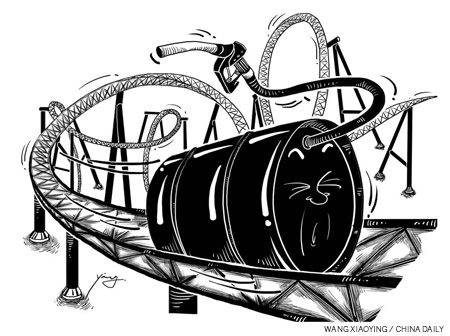Opinion
Oil prices a worry for Asian neighbors
By Amitendu Palit (China Daily)
Updated: 2011-05-11 14:29
 |
Large Medium Small |

China and India both are worried about the impact of high oil prices on their growth prospects. Global oil prices had begun increasing in 2010, well before problems surfaced in North Africa and the Middle East. As the world economy gradually recovered from recessionary conditions, demand for oil increased, hiking its prices.
The first quarter of 2011 saw prices rising further because of disruptions in oil supplies from Egypt and Libya. Though the Organization of Petroleum Exporting Countries has increased production, inflationary fears over crude oil prices are getting stronger. The news of Osama bin Laden's death had depressed oil prices temporarily. But they have begun rising again.
In its latest assessment of the world economic outlook, the International Monetary Fund (IMF) projects global oil prices to increase by more than 35 percent in 2011. The prediction may come good, given the current trends. From about $70 a barrel this time last year, oil prices increased to $125 a barrel at the end of April 2011. They dropped below $115 a barrel following bin Laden's death. But this will probably be a short-lived trend because fears of greater turbulence in West Asia will lead to increase in prices.
As two of the world's leading oil consumers and crude oil importers, demand for oil in both countries is relatively price-inelastic. Given their growth trajectories, neither country will experience decline in demand for oil in spite of high prices. And as they keep buying oil at high prices, both will feel the impact on their balance of payments, inflation and GDP growth. Higher oil imports will reduce their trade surplus and bring down their current account balances.
China's large trade surplus will help in absorbing a major part of high import costs and can marginally moderate the current account balance. For India, however, the scenario is more worrying. Its current account deficit of 3.2 percent of GDP can worsen because of high oil imports and a deteriorating trade balance.
India and China both will be worrying about the effect of oil prices on domestic inflation, too. High crude prices will lead to higher prices of gasoline, liquid petroleum gas, diesel and aviation fuel and result in higher producer and consumer prices in all domestic energy-intensive activities.
Inflation is already high in both countries. Further rise in domestic prices means more hardships for low and middle-income groups. India has already raised interest rates for tackling prices. High interest rates, however, can discourage investment and depress GDP growth. According to the IMF, if crude oil prices reach $150 a barrel, they may reduce GDP growth for 2011 by 0.50-0.75 percentage point in China and by about 0.25 percentage point in India.
Both countries are helpless when it comes to oil prices because they can hardly influence them. Lack of adequate oil supplies in the Asia-Pacific region ensures that China and India continue to depend on oil from North Africa and the Middle East. This dependence increases their vulnerability to supply disruptions in the Persian Gulf and the resultant volatility in oil prices.
A possible option for both countries to reduce this dependency is to shift to other suppliers of oil and energy. Russia may be one such supplier. Europe is trying to reduce its reliance on the Middle East by procuring more oil from Russia. For China and India, too, Russia can be a feasible alternative, more so because China, India and Russia are members of the BRICS club and are already cooperating with each other on several issues.
A second course of action for minimizing the harms caused by high oil prices is to coordinate spot purchases of crude oil from the international market. In recent years, China and India both have been responsible for driving up prices in the global oil market because of their large demands. Both countries had discussed the possibility of coordinating spot purchases of crude oil during Premier Wen Jiabao's visit to India in December 2010. So effective coordination of oil purchase will help both in avoiding unexpected volatility in prices.
A third option is to enter into more forward contracts with suppliers for future purchase of crude oil at previously agreed prices. But given the current high prices of oil, delivery prices in such contracts may also be high. This is where the negotiating skills of oil companies from both countries will be tested as they try to secure favorable forward delivery contracts.
The author is head of Development & Programmes and visiting senior research fellow at the Institute of South Asian Studies in the National University of Singapore.
| 分享按鈕 |



